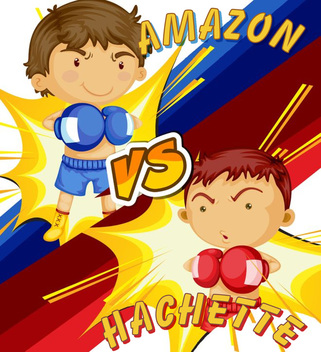
It’s about Hachette, about Amazon. And who knows? They could announce any instant now that Hachette has “won” (likelihood 5%–10%) or that Amazon “won” (90%–95%). After all, who would have thought that in the midst of all the above parties’ mutual pummeling, Amazon would have come to a seemingly amicable agreement last month over the same issues with Simon & Schuster (terms secret, of course, just like the Amazon and Hachette bargaining stances).
Though Amazon started out in the book business, that tiny piece of its balance sheet has become dwarfed by toiletries, sweaters, snow shovels, and other items more essential to the “real world” than mere words and ideas. Amazon is in the business of selling, unlike most companies which are in the business of making money. Buying customers, with price and convenience, is Amazon’s M.O., and what product it’s selling to any particular customer is pretty secondary.
Obviously, the short-term gain for the customer comes from paying as little as possible for whatever you’re buying. So when Amazon insists it’s on the reader’s side, the guys with green pictures in your wallet are going to cheer their approval.
But then there’s the matter of Amazon’s unique business strategy. While the recent claim that the company has created a monopoly is pretty specious, it’s tough to avoid the fear of “potential monopoly” when the goal is to sell everything to everyone (a competition with only one real rival: Walmart). What happens when Amazon succeeds, when it really can set whatever price it chooses for books and all its other commodities? Do we assume desire for profit will then be outweighed by Jeff Bezos’ love for the good, the true, and the beautiful?
Is Amazon really on the customer’s side? Is Hachette really on the author’s side? Don’t be silly! Hachette is on Hachette’s side, like Amazon is on Amazon’s side. That’s the basic nature of the game; it’s called capitalism.
Bottom line, naturally, the issue is power: who gets to call the shots (i.e., set the prices). Authors by the hundreds have rallied to each of the adversaries, depending on which side of the page they see their butter on.
To those in the Amazon camp, it’s all pretty simple: Lower prices mean more sales, more readers. And it doesn’t really matter if the seller gets those buyers the same way it gets them for any other product.
But for those of us to whom books have a little in common with oxygen, it’s an analogy that rankles on the level our neurons fire at. Yes, we’re economic animals, but we’re also beings who can sometimes contain larger values, part of our human uniqueness.
What’s an idea worth? What does a well-turned phrase add to my life? What’s the importance of a character who gives me a little more understanding of the world I live in? These values are real, even though you can’t give them a price tag.
And because they are the content of its “products”—the thread count of its linens, if you will—Hachette seems slightly closer to understanding them than its enemy of the moment. There’s little enough else to hang on to in their battle, so that’s enough for me.

 RSS Feed
RSS Feed

